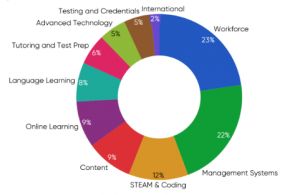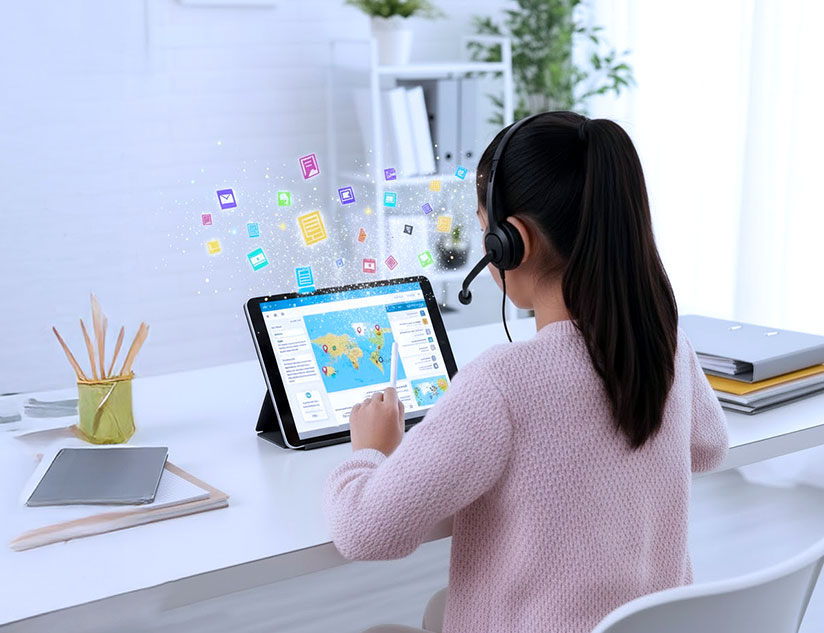Shockingly, 50% of global edtech is focused on workforce and management systems and not on actual learning! However, this is about to change. The edtech market is expected to grow at a CAGR of 15.52% between 2022 and 2027. A forecast to surpass $600 billion by the end of that period indicates that the industry is likely to undergo an astonishing transformation.
Image source: https://www.holoniq.com/notes/global-edtech-1000-2021-stats-and-2022-applications-open
Here are the top edtech product trends that will drive innovation and growth in 2023:
-
Virtual Labs
Augmenting learning with experiences has been one of the key principles of boosting retention and engagement. This focus will likely bring Augmented and Virtual Reality (AR/VR) into the spotlight. In contrast to brick-and-mortar labs, digitally simulated labs will enable students to explore and experiment more freely, thus engaging them beyond curricula. EdTech companies are focussing on creating immersive experiences for learners across age groups.
-
Nano-Learning Modules
Gen Z is accustomed to ultra-fast learning. The future of education will welcome bite-sized modules to facilitate quick, anytime, anywhere learning. With life becoming increasingly hectic, the learn-as-you-need methodology is befitting society’s need to pass on knowledge and gain proficiency.
-
Personalized Education
The theme for 2023 will be to make education accessible to all and adaptable to the needs of those who traditionally find it difficult to fit into the inflexible education system. Education technology is preparing to provide additional support in the form of multilingual lessons, audio assistance for the visually impaired, and many more such facilities. In addition, learner speed and inclination assessment with the use of advanced analytics will help deliver education that meets the needs of each individual learner to drive better academic outcomes. Nano-learning modules, combined with analytic reports, will drive lesson planning, assessments, and goal setting for education in the coming years.
-
Subscription Services
In the current era of skill-gap emergency, there is a dire need to support lifelong learning. Digitization has brought learners and educators closer via the Internet and mobile learning facilities. In the future, platforms that allow subscription-based, self-driven learning will be the preferred choice.
In the elementary and middle school segments, edtech companies are also coming up with K-12 home-schooling services. This move is aimed at helping the nomadic generation arm digital natives with tailored learning resources, curricula, and self-designed outcomes.
-
STEM Education Takes a Bow
A few years ago, STEM was considered an arena of the elite. Digital pens and robotic kits were considered unnecessary luxuries. However, now, digital pens are the go-to tool for students and educators to sketch a model before printing a 3D version. And robotic kits are enabling students as young as 5 to build an analytical mindset. More such tools will help edtech evolve into an ecosystem of cross-domain understanding.
-
Digital Credit
The edtech industry has introduced many standards to create an ecosystem with a learning framework that can help learners transition seamlessly through the various learning stages. Credits in-line with academic standards and vetted education models with assessments, which can reveal skill acquisition status, will form the basis of progress to the next level. EdTech companies are engaging aggressively to meet global and domestic standards to come at par with long-standing school systems and become a credible source of certification.
-
Flipped Classrooms
EdTech is on the path to becoming the primary educator for the generations to come. This will transform how physical education centers operate. Imparting knowledge has remained a repetitive activity for years. Now that edtech software can take care of that aspect, concrete buildings will perform the job of teaching the application of concepts. Classrooms will be flipped with “homework” centers while students will use the time beyond school to accumulate knowledge at their own pace. This will help nurture innovation and creativity while also ensuring the requisite guidance.
-
Phygital Learning Solutions
The flipped classroom brings us to the latest form of hybrid learning. Where physical and digital learning will be coupled to ensure that learning goals are achieved by students. The key role of edtech companies will be to facilitate teachers to perform their duties effectively while freeing up their time for better student support. Tasks such as assessment evaluation and student progress report creation will be automated. Teachers can then focus on aiding the development of learning modules and guiding students on how to use the skills they acquire.
-
Plug-and-Play Learning Products
The year 2023 will witness an explosion of pluggable edtech modules. As most education systems have, in one way or another, incorporated edtech into their environment, it becomes paramount that a uniform paradigm of education is developed to ease the adoption and transition between diverse learning solutions. Pluggable solutions will enable the scaling and evolution of learning systems without the need for cumbersome migration that may become a demotivating factor among users.
The future of learning is filled with diverse learning formats, and adaptive and flexible curricula to accommodate all types and age groups of learners. Talk to us now to learn how we can help your edtech firm stay ahead of the competition.
















